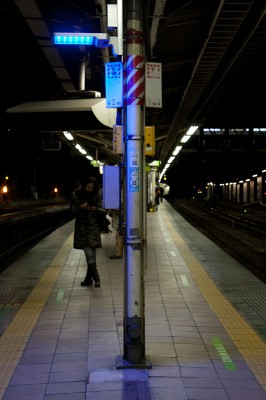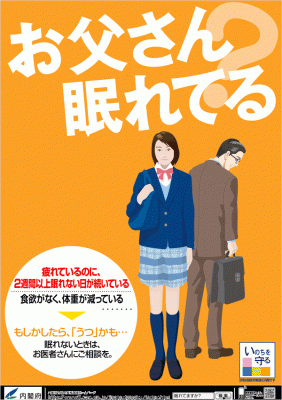
Weekly magazine Shukan Post’s most recent issue contains an interesting article about a topic that likely falls close to home for many dwellers of the Japanese concrete jungle. Train jumpers, a form of suicide Japan is arguably infamous for, are so common in the Tokyo area that we hardly blink an eye when we see a train delay due to the ominous “人身事故” (jinshinjiko–human accident).
In fact, in a recent news story covering an accident (its unclear whether it was a suicide or not) on the Tokyo Monorail Line on Tuesday, alternative news site Sponichi Annex actually quotes one bystander as saying, “駅に来て事故を知った。これから帰るのに、振り替え輸送の私鉄の駅まで歩かなければならない” (“I found out about the accident when I got to the station. I just want to go home, now I’ve got to walk all the way to a station on a different line”).
According to the Shukan Post, on average March has the highest rates of suicides of any month out of the year with an average of 100 people taking their own lives every day. The reason is unclear, they say, but may have something to do with the fiscal year, which ends on March 31. In a 2008 survey of population trends, the Ministry of Health, Labor and Welfare lists suicide as the top killer of people aged 20-39. As the Post puts it, Japan is a country where “those in the prime of life choose death.”

Thus, March is officially “Suicide Prevention Reinforcement Month.” The cabinet office has launched a campaign focusing on the connection between lack of sleep and suicide. Signs on trains and around stations ask, “眠れてますか?” Have you been able to sleep? The connection between sleeping problems and suicide have been documented in the past, but for a nation of chronic workaholics who often either go home to disfunctional families, only see their families on the weekends, or live completely seperately from their families, simply opening a dialog with the campaign’s slogan, “お父さん、眠れてる?” (Otou-san, nemureteru? – Dad, have you been able to sleep?) may make a world of a difference.
Suicide prevention support NPO Lifelink has, through interviews with family left behind after suicides, published white papers on the state of suicide in Japan. The research delved into how those who have died were living beforehand, and singled out certain common factors that may indicate someone is considering suicide, much like “Otou-san nemureteru?” Based on the Lifelink findings, Shukan Post lists a simple test for readers who are concerned about suicidal tendencies in themselves or others.
If you or someone you know…
1. Received a promotion within the last year: 3
2. Has gone through a job rotation recently: 5
3. Often changes jobs: 5
4. Has recently been demoted: 10
5. Has a lot of work and is often tired: 7
6. Is worried about their relationship with coworkers: 5
7. Has made a huge slip-up at work within the past year: 5
8. Gets bullied or put down at work: 7
9. Is on temporary leave: 7
10: Is unemployed: 10
11: Is working at a company with unstable management: 1
12: Recently failed at a job change: 7
13: Has taken out a home loan:3
14: Is responsible as someone’s guarantor (on a lease, etc.): 7
15: Feels burdened under many responsibilities: 10
16: Doesn’t converse with the family when they get home from work: 3
17: Has a spouse that is seeking divorce: 5
18: Hasn’t had much of an appetite for two weeks or longer: 7
19: Has lost three kilograms or more within the past month: 5
20: Has a chronic illness: 3
21: Has severe shoulder pain: 1
22: Suffers from chronic back pains: 3
23: Has severe diarrhea: 3
24: Is tired but hasn’t been able to sleep well for two weeks or longer: 7
25: Must have a drink after work: 3
26: Has had a family member pass away recently: 5
27: Is concerned about their child’s educational or employment future: 1
28: Feels pressured about how to take care of elderly parents: 3
29: Can’t get the household budget out of the red month after month: 3
30: Has a poor relationship with their children: 3
For scores between 10-24, risk of suicide is low, but the individual should work to reduce general stress levels. For scores between 25-39, any major changes in one’s home or work environment need to be handled with care. For scores of over 40 points, they recommend getting help immediately.
Note: The Complete Manual of Suicide (完全自殺マニュアル)(first pub. July of 1993) apparently does sell more copies in March than other months, based on conversations with booksellers and industry sources. The book has been in the top 100 best-selling non-fiction books on Amazon.co.jp for over 181 days and as of 2:am, March 12th, Japan time, it was the 45th best-selling non-fiction book and moving up the charts. I’m not a fan of this book, as anyone who has read TOKYO VICE would probably already know. I’ve always felt it doesn’t just show you how to kill yourself, but actually encourages you to do it. Not very nice. (Jake)
I am very sad when I read this. Japan’s economy is currently filled with many unhappy and defeated very Hard Workers. If you are working hard and you love your job, it doesnt lead to such depression but thinking of all the effort ending in nothing and all the sacrifices you’ve made along the way, can really push someone over the edge. We try to give people the freedom to enjoy life and work. Working hard is definitely a good thing but burning out is bad. We as managers need to know when our precious employees are crossing the line from hard work to burn out.
Yeah, I agree with you too Ruth.
There is a lot of social pressure in Japan to comply to a certain way of thinking and doing things. A lot of people want to have more freedom, but at the end of the day it is up to the managers to take that step to a better way of working.
According to this research the peak in suicide is actually in April, in case you’re interested: http://www.ncbi.nlm.nih.gov/pubmed/15575348
So maybe it is after the financial figures are published, instead of before.